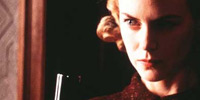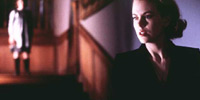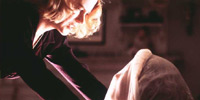
 |
The Others (2001) Directed by Alejandro Amenabar Cast: Nicole Kidman, Alakina Mann, James Bentley, Fionnula Flanagan, Christopher Eccleston, Elaine Cassidy, Eric Sykes. 2001 – 104 minutes Rated: Reviewed by Dustin Putman, August 11, 2001.  "The Others," directed by Alejandro Amenábar (1999's "Open Your Eyes"), is a gorgeously woven motion picture that manages to be as emotionally rewarding as it is genuinely spine-chilling. An eloquent and deeply affecting ghost story, the film bears a superficial resemblance to 1999's "The Sixth Sense," yet distances itself from that equally fine movie by imposing upon the viewer its own personal layers of shivering atmosphere and signs of approaching dread that could only be classified as its own.
"The Others," directed by Alejandro Amenábar (1999's "Open Your Eyes"), is a gorgeously woven motion picture that manages to be as emotionally rewarding as it is genuinely spine-chilling. An eloquent and deeply affecting ghost story, the film bears a superficial resemblance to 1999's "The Sixth Sense," yet distances itself from that equally fine movie by imposing upon the viewer its own personal layers of shivering atmosphere and signs of approaching dread that could only be classified as its own. Set almost entirely within a mansion on Britain's Channel Islands, circa 1945, Grace (Nicole Kidman) is a stringently religious woman living with her two precocious children, Anne (Alakina Mann) and Nicholas (James Bentley). With a husband (Christopher Eccleston) presumably lost amidst the horrors of World War II, she is greeted one day at the door by three people who have come to act as her servants--kindly, no-nonsense Mrs. Mills (Fionnula Flanagan); reserved Mr. Tuttle (Eric Sykes), and young, mute Lydia (Elaine Cassidy). Grace promptly explains to them that Anne and Nicholas have a rare photosensitive disorder that bars them from ever being exposed to sunlight, and so whenever they enter a room, the curtains must be closed on all the windows and each door must be locked before opening another. As they begin to settle down into a pattern of normalcy, Anne refuses to keep quiet about her sightings of others hiding in the house, which she labels "intruders." A devout Catholic, Grace refuses to believe her daughter's seemingly made-up stories until she, too, starts having frightening experiences that gradually lead her to believe in the existence of otherworldly entities.
Set almost entirely within a mansion on Britain's Channel Islands, circa 1945, Grace (Nicole Kidman) is a stringently religious woman living with her two precocious children, Anne (Alakina Mann) and Nicholas (James Bentley). With a husband (Christopher Eccleston) presumably lost amidst the horrors of World War II, she is greeted one day at the door by three people who have come to act as her servants--kindly, no-nonsense Mrs. Mills (Fionnula Flanagan); reserved Mr. Tuttle (Eric Sykes), and young, mute Lydia (Elaine Cassidy). Grace promptly explains to them that Anne and Nicholas have a rare photosensitive disorder that bars them from ever being exposed to sunlight, and so whenever they enter a room, the curtains must be closed on all the windows and each door must be locked before opening another. As they begin to settle down into a pattern of normalcy, Anne refuses to keep quiet about her sightings of others hiding in the house, which she labels "intruders." A devout Catholic, Grace refuses to believe her daughter's seemingly made-up stories until she, too, starts having frightening experiences that gradually lead her to believe in the existence of otherworldly entities. In his first English-language feature, the remarkably fascinating achievements permeating throughout "The Others" are due solely to Alejandro Amenábar, who not only has directed the film, but also written the multidimensional screenplay and composed the subtly chilling music score. As a classic horror picture, "The Others" is the best kind, weaving its spell in a deliberately slow fashion that penetratingly involves you in its central characters and their unfortunate plight. The film is without overt violence or bloodshed, but one-ups these elements by creating a masterful ambiance of both mood and unshakable trepidation that is far more haunting than the sight of a masked killer hacking away at a pretty teenaged cast.
In his first English-language feature, the remarkably fascinating achievements permeating throughout "The Others" are due solely to Alejandro Amenábar, who not only has directed the film, but also written the multidimensional screenplay and composed the subtly chilling music score. As a classic horror picture, "The Others" is the best kind, weaving its spell in a deliberately slow fashion that penetratingly involves you in its central characters and their unfortunate plight. The film is without overt violence or bloodshed, but one-ups these elements by creating a masterful ambiance of both mood and unshakable trepidation that is far more haunting than the sight of a masked killer hacking away at a pretty teenaged cast.If "The Others" is an example of sheer cathartic artistry, then it excels even more as it maturely grapples with themes of faith and religion. Most intriguing of all is the beliefs which Grace possesses--beliefs that she starts to question as the circumstances within her home grow progressively more dire. Teaching her children about the Bible, Grace assuredly discusses its topics with the directness of a person who is positive what she believes is true. Grace is very serious about her Catholicism, which only distresses her more when things begin occurring to her that contradict everything she has ever learned and studied. Serious religious issues that are tackled head-on never, or rarely, arise in the horror genre, and the fact that this one does only allows for a more wholly satisfying experience. The movie is scary fun, to be sure, but also offers up various thought-provoking evocations that raise it up a few notches further. Nicole Kidman, an actress who has been around for over a decade but never fully allowed to test out her acting range, has come out of her shell in the last few months with two very different films that also, incidentally, are the two best performances she has given. In "Moulin Rouge," she played her part--that of a high-spirited, dreamy courtesan unknowingly dying of tuberculosis--to perfection, and also got to uncover a glorious singing voice. With "The Others," Kidman is more emotionally unhinged, more serious, more insecure about the entire world around her. Easily the star attraction, as she inhabits almost every scene, and Kidman rises to the challenge, passionately portraying Grace as a woman who is as internally weak as she is externally strong. Newcomers Alakina Mann and James Bentley, as Grace's children, are extraordinary. It is rare to get so much unblinking reality and nuances out of child performers, especially those making their acting debuts, but Bentley and, especially, Mann are the real deal. Their roles are not easy, either. As Anne, Mann must project a childlike playfulness with an air of stern maturity beyond her years, and she achieves this without taking one misstep. With lush cinematography from Javier Aguirresarobe, who excels in giving the surroundings a dank, eerie feel that perfectly complements the fog-enshrouded, desolate outdoors, "The Others" is a marvelous entertainment with a depth that gives viewers a little something extra to chew on long after the lights have gone up. And while one of the climactic twists isn't terribly surprising, the final corkscrew in the plot is nearly impossible to predict, and also ingenious. Kudos must go out to Amenábar, whose expertise and intelligence help to make "The Others" more than 'just another supernatural thriller.' It is a disquieting, classy, superbly realized horror tale that should not, and will not, be forgotten. ©2001 by Dustin Putman |
 |













